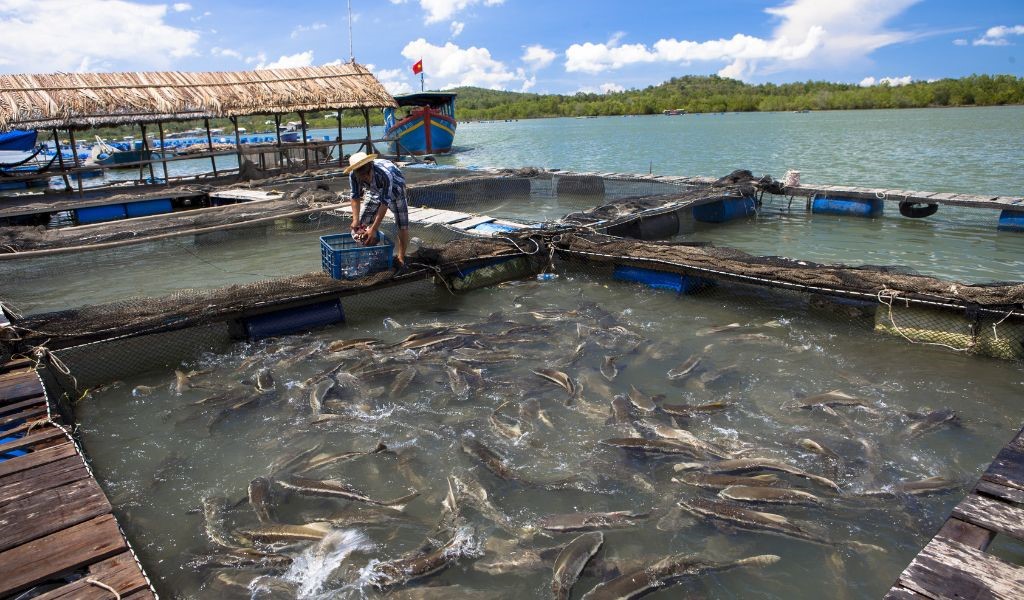Our food system is broken, and our food value chains – comprising those people, institutions, and businesses that bring food from farm to table – are part of the problem. Our food system fails to provide stable and resilient sources of livelihoods for marginalised people, eradicate hunger, provide healthy and nutritious food to everyone and safeguard the ecosystem. Most citizens, policymakers, practitioners and researchers agree: we need to see transformation toward social and ecological sustainability. But how?

This is the question our new project ‘Exploring Power Toward Sustainable Aquaculture Value Chains in Vietnam’ will investigate. For the next two years, researchers at IDS, Vietnam National University of Agriculture (VNUA) and Vietnam National University (VNU) will work to understand the sociopolitical, economic and historical power relationships that influence the livelihoods of vulnerable people producing, supplying and selling the products of fish and seafood farming in Vietnam.
We will also explore the multiple factors that affect the sustainability of this aquaculture sector, including poverty, antimicrobial use (which contributes to the growing public health threat of antimicrobial resistance) and waste management.
Impacts on livelihoods
Fish and seafood consumption in Vietnam has increased threefold in the last 30 years as a result of rapid economic development, according to the Food and Agriculture Organization of the UN. This has had important and positive implications for livelihoods and job opportunities. However it has also raised concerns about poor working conditions and environmental degradation.
Our project comes at the right time. Recent economic, health and political shocks experienced across the world have demonstrated that food systems are neither resilient nor equitable. For instance, the Covid-19 pandemic showed that livelihoods in food systems are precarious.
Similarly, our food systems rely on highly specialised producers of key commodities for markets globally. For example, the international trade of wheat, that relies on Ukraine’s agriculture sector, was severely disrupted by the Russia-Ukraine war, and led to a sharp increase in the prices of staple food, such as bread and oil. This affected the food security of vulnerable people in conflict-prone states around the world, such as Yemen.
Understanding sustainable food systems
In response to these shocks and observation of their consequences, many governments and scholars are now calling for more equitable, resilient and sustainable food systems.
Our project contributes to this debate by understanding how equity and sustainability may be achieved in aquaculture production in Vietnam. Power relationships – between individuals, institutions, countries, etc. – influence how people can access key resources, such as land, credit and farming inputs, to earn their living. Access to key resources affects how stable and resilient a livelihood they can make.
Our project will quantify the consequences of power relationships on economic indicators critical for livelihoods – such as product prices, wages and income, credit interest rates and transaction costs. We will also explore how historical power dynamics shape the modern-day laws, regulations and institutions that are key to people’s livelihoods.
Micro-level power in value chains
These two aspects of our project – quantification of power and historical analysis of laws and institutions – are both new and exciting. Power is a concept of long academic and practical debates. In the value chain community, it has been long recognised as an important determinant of who loses and gains from (global) networks of firms, producers and consumers. Many scholars have looked at how power relationships influence labour standards, conditions of employment, income and participation in sustainability standards.
However, these analyses look at issues at the macro-level. The lack of micro-level insights means that we do not understand how these macro-level power relationships manifest at the micro-level and so what kinds of power relationships influence the everyday economic reality of marginalised people. For instance, how these micro-level power relationships impact their wages, income, costs of production and trade, and transaction costs from the work they do.
Without micro-level quantitative evidence, we cannot identify practical actions going forward. Global value chains may be associated with issues of power which are linked to the economic vulnerability of marginalised people. But what other livelihood options do people have? If global value chains are not the way forward for more just and sustainable food systems, are local value chains better? We hope our unique mixed-methods approach at the micro-level can address these questions.
More on the Food Equity Centre
History and aquaculture regulation
Similarly, this new project will explicitly focus on understanding how modern-day power relationships are influenced by the past through a historical analysis of aquaculture-based livelihoods.
First, we will explore how today’s laws and regulations developed in Vietnam were developed and enacted amid particular geopolitical, economic and social dynamics informed by particular understandings of the world. One part of our analysis will be to understand what these rules intended to do and consider how the historical legacy of these rules influences people’s livelihoods, their behaviours and sustainability outcomes today.
Second, we will look at the history of aquaculture cooperatives. Cooperatives are an important form of collective action, but also a critical fabric that realises Vietnamese socialism. As a result, they are subject to influence by the national and local governments. We plan to take a deep-dive into the history of aquaculture cooperatives and explore how and whether they contribute to improving marginalised people’s livelihoods, and their roles in meeting sustainability goals.
This work builds on a longstanding collaboration between the project partners and IDS’s involvement in many One Health projects. In previous projects, researchers have identified social and economic determinants of poor public health, gender relations along livestock value chains, vulnerability and precarity of livelihoods for vulnerable groups, and strategies to improve the economic and health sustainability of livestock value chains. Through this project, we will generate integrated evidence that links all sustainability issues and identifies actions that can address multiple interconnected challenges.